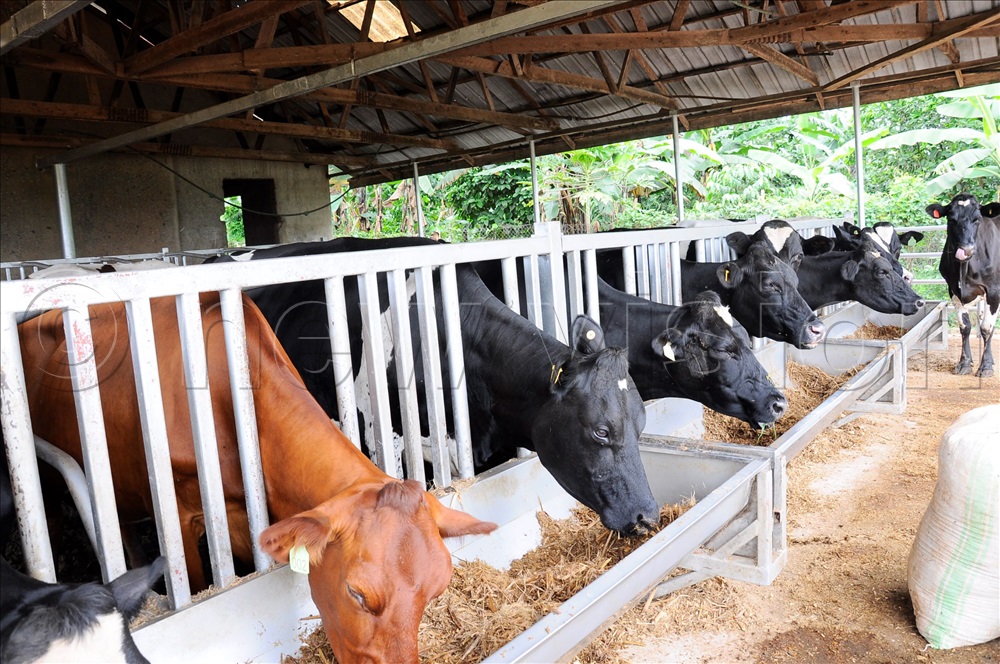By Umar Nsubuga
When you reach Kamata Farm in Rwentale-Kamata village, Kigoyera Parish, Kyarusozi sub-county in Kyenjojo district, you will find cows that produce milk at the farm are healthy and an effective health care programme is put in place.
Phoebe Kagambe Kusiima, last year’s best farmer and the Kamata Farm owner says that her farm establishes the herd with disease resistance.
She says when she was choosing breeds and cows, she knew that they were well suited to the local environment and farming system of Kyenjojo District.
She considered maintaining the herd size and stocking rate based on management skills, local conditions and the availability of land, infrastructure, feed, and other inputs.

Donazio Byamugisha, the farm assistant manager says vaccinating all animals every three months is a must, it’s a recommendation.
“We are aware of the infectious diseases which threaten dairy cow health and welfare. Because of this, we know that it can decrease productivity and profitability,” he says.
Peter Mubiru, a veterinary doctor says vaccination is an important component of control and prevention of diseases.
“Besides a vaccination programme, a farmer consider good nutrition, adequate ventilation, effective sanitation, and other health management procedures,” Kagembe says.
Preventing entry of disease onto the farm
According to Kagambe, it’s important only to buy animals of known health status (both herd and individual animals). This controls their introduction to the farm using quarantine if indicated.
It’s also important to ensure animals transported on and off the farm don’t introduce diseases.
“Monitor risks from adjoining land and neighbours must have secure boundaries. Where possible, limit access of people and wildlife to the farm. Have a vermin control programme in place at the farm,” Kagambe advises.
Vermin is defined as any undesirable or disturbing offender such as flies, lice, fleas, cockroaches, ticks, mice, rats, or weasels.
According to Kagambe, programmes should be designed to prevent, control, or eliminate the presence of or infestation by pests are essential in an animal environment at the farm.
She says your animals should only use clean equipment from a known source, and it’s important to have an effective herd health management programme in place.
Use an identification system [Plastic ear tag] that allows all animals to be identified individually from birth to death.
Giving time to your farm is key, Kagambe says regularly checking on your animals for signs of disease is important.
“Sick or injured cows should be attended to quickly and in an appropriate way. Proper and timely identification of sick or injured cows helps minimise unnecessary treatment expenses and preventable production losses. Sick cows can be identified in several ways. The most popular are rectal temperature and visual indications.
The vital signs of a sick animal will change. The temperature may go up (40 degrees Celsius) or down. A rise in temperature of one or two degrees usually indicates pain, while a rise of more usually indicates infection. The rate of respiration and the way the animal breathes could also slow changes,” she advises.
Mubiru advises farmers to keep new or sick animals in an isolation paddock, separate milk from sick animals and animals under treatment, keep written records of all treatments and identify treated animals appropriately.
He also advises farmers to manage animal diseases that can affect public health (zoonotic disease).
“These types of diseases like anthrax, animal flu, and brucellosis, among others, pass from an animal or insect to a human. Some don’t make the animal sick but will sicken a human”, he explains.
Measure the heart girth of the animals regularly using a tape measure and convert the measurement to a fairly accurate estimate of the animal’s body weight.
Kagambe says weight is very effective in assessing the reproductive efficiency and growth performance in animals. It is used in determining the health status of an animal when measured in relation to its age.
For example, an animal’s loss of weight is an indication of poor health and, on the contrary, gaining it shows that the animal is in good health.
In addition, weight is also used in measuring the correct dose of therapeutic pharmaceuticals to treat animal diseases, and to avoid the risk of underdosing or overdosing.
Using chemicals and veterinary medicines as directed
Only use chemicals at the farm that are approved for supply and use under relevant legislation, Mubiru says it’s important to use chemicals according to directions, calculate dosages carefully and observe appropriate withholding periods.
“Only use veterinary medicines as prescribed by the farm veterinarian. Store chemicals and veterinary medicines securely and dispose of them responsibly,” he says.





